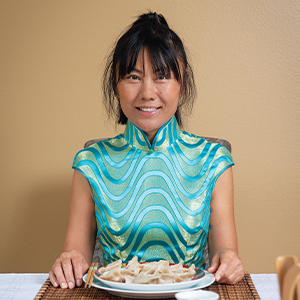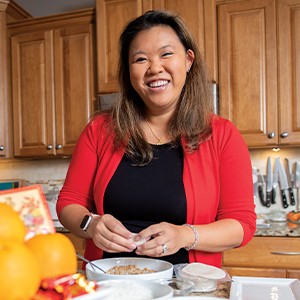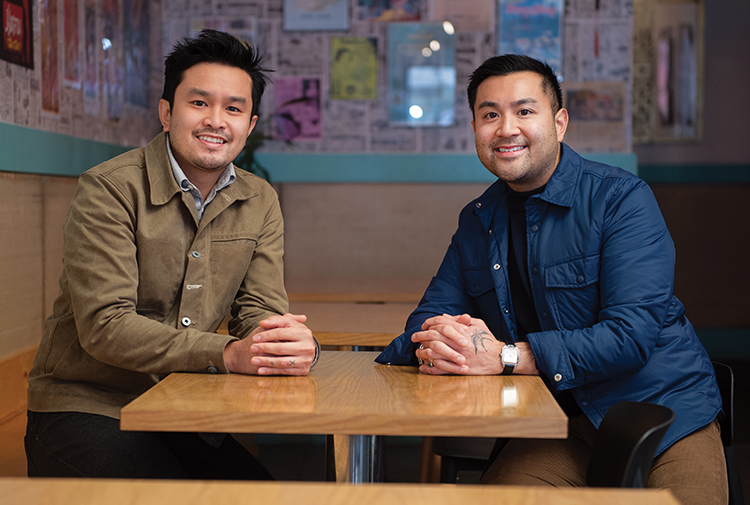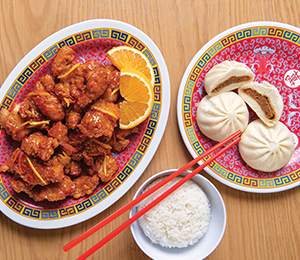Local artists from Project7 Design painted this mural on the back patio of Lucky Lotus on Ingersoll in 2022.
Writers: Mathany Ahmed, Hailey Allen and Michael Morain
Photographer: Duane Tinkey
When the new moon rises on Feb. 10, billions of Asians across the world will ring in the auspicious Year of the Dragon. It’s the fifth sign in the traditional 12-year East Asian zodiac cycle, characterized by power, strength and good luck.
Here in Iowa, more than 75,000 people claimed exclusively Asian descent in the 2020 census, including more than 24,000 in Polk County. The number of Asian Americans in Iowa has more than doubled over the last 20 years and now accounts for about 2.5% of the state’s population.
There are countless Lunar New Year traditions to promote good health and fortune, from daffodils in Vietnam to kumquats in Singapore and red envelopes stuffed with money in China and the Chinese diaspora. But for everyone, including the following Central Iowans, each and every custom emphasizes friends and family.

Moon-Shaped Sweets and Ear-Shaped Dumplings
Phoebe Liang D’Alessandro jokes that her name says everything you need to know about her background. Phoebe is the English name she adopted for its pronounceability, Liang is her Chinese family name, and D’Alessandro is the last name of her Italian husband.
Her experience in blending cultures makes her a better Chinese ambassador at CultureAll, a local nonprofit that educates Iowans about global cultures from across the globe. She spends her days introducing Iowans to Chinese traditions, including the Lunar New Year.
D’Alessandro’s memories of the holiday in Hubei, the central China province where she grew up, are overwhelmingly happy. Her entire family would spend weeks preparing for the celebration, decorating the house in red paper lanterns and fresh flowers. Big family meals filled the days, and fireworks lit up the nights.
“For the Chinese community, fundamentally, the new year means happiness and hope,” she said.
The feasting begins with a meal on New Year’s Eve, one of the year’s biggest culinary events. Specialties vary by region, but D’Alessandro’s family always eats fish in order to bring fortune in the coming year. For many years, it was a rare treat. “We didn’t really have lots of good stuff to eat by today’s standards, like meat or eggs or fish,” she recalled. “We had to be very frugal in daily life.”
The first meal of the year is also important. Typically, families get together ahead of time to prepare dumplings stuffed with meat or veggies. They molded them into the shape of an ear, a tradition supposedly started after an ancient Chinese doctor used dumplings to save patients from frostbite and fever.
On the last day of celebration, people traditionally eat tangyuan, a sticky rice treat stuffed with sugar, oil and seeds. The dessert is round, like the moon, as well as traditional dinner tables and the oranges families place on altars. Circles represent unity, which has become even more important as industrialization, emigration and, more recently, the pandemic have separated family members from one another.
“One of the most important elements of Chinese New Year is the family reunion,” D’Alessandro said. “It’s the one time of year we can get everyone together.” — Mathany Ahmed

Envelopes Stuffed with Money (and Luck)
Pauli Wong Smith has good reasons to follow her family’s Chinese New Year traditions to promote wealth, health and longevity. Three of her great-grandmothers lived to at least 98.
As a girl in California, she visited one of them in Stockton whenever she had to do a history project for school. “When the Titanic movie came out, she remembered the real thing,” Smith said. “When people were sent to internment camps” — on the West Coast during World War II — “my family had to prove they weren’t Japanese.”
Smith grew up in San Francisco in a big family with Chinese roots on both sides.
When she was a kid, her dad’s family lived in Chinatown and celebrated the new year with “all of those old superstitions” — wearing new clothes, visiting cemeteries and cleaning out the house to sweep out any evil spirits. Her mom’s family’s traditions were more Americanized and focused on the exchange of red envelopes stuffed with money, known as “hong bao” in Mandarin and “lai see” in Cantonese.
Both sides of her family still celebrate with big dinners that feature certain foods — noodles, seeds, dried fruit — that can bring specific kinds of good luck. (Sidenote: Some foods may bring bad luck. According to Chinese tradition, “animals should be served whole or else its spirit will come back to haunt you,” Smith said. That’s why you see whole fish, chickens and ducks at Chinese markets.)
Smith went to cooking school in Chicago, married an Iowan in 2006 and now works as a food and nutrition training specialist for Des Moines Public Schools. She often hosts a Chinese New Year feast at her family’s home in Johnston, with steaming mountains of pot stickers, crab Rangoon, lo mein, fried rice, and beef and broccoli that she makes with her daughter, Lilly.
It’s an Americanized — even Iowanized — spread that looks different from the ones Smith grew up with. “Because the old generation has kind of gone,” she said, “it’s up to the younger generation to determine which traditions to keep.” — Michael Morain
(Full disclosure: Smith is my sister-in-law, so I can personally vouch for her cooking. Thanks to her, my own favorite Lunar New Year tradition involves Tupperware filled with leftovers.)

Souriyno and Kevin Chen
Tray of Togetherness

For Kevin and Souriyno Chen, Lunar New Year is a time to gather with family and friends over a delicious feast.
The brothers own Lucky Lotus, an Asian restaurant on Ingersoll Avenue where the menu is inspired by their heritage and the foods they enjoyed with their family growing up. It’s easy to spot why food and family are so important: The brothers’ parents owned Cafe Fuzion on the east side from 2006 until it transformed into Lucky Lotus in 2019.
The Chens are predominantly Lao and Chinese. Kevin and Souriyno’s parents immigrated to Des Moines from Laos to escape the Vietnam War, and since then, family members have scattered throughout the Midwest, West Coast and up to Toronto.
So, their Lunar New Year traditions emphasize kinship and reunion. Along with a feast of roasted or fried meat, steamed fish, noodles and fruit, they fill an eight-compartment platter called the Tray of Togetherness with sweets, dried fruit and candy.
The holiday also emphasizes looking to the future with positivity and hope, but the Chens make sure to include all members of the family, present and past. “Before we eat, we make sure to hold a ceremony for those who have passed, and we place food at an altar as a sign of respect,” Kevin Chen said.
At Lucky Lotus, the Chen brothers share flavors and dishes from their own childhood with the rest of the city. And lucky us: The restaurant plans to offer a few Lunar New Year favorites, including orange chicken and hibiscus orangeade. “Oranges and tangerines are believed to bring good luck and happiness for the new year,” Kevin Chen said. “The color red signifies good fortune, luck and vitality” — hence the bright red hibiscus orangeade — “and noodles symbolize longevity.”
He said the symbolism that surrounds each dish is “one of the most captivating things about the Lunar New Year celebration.” — Hailey Allen











